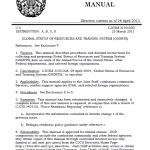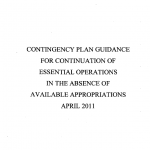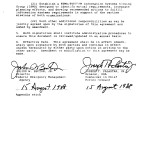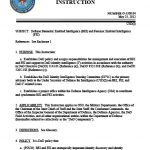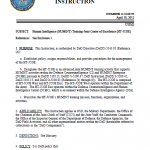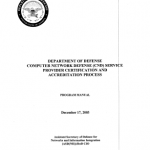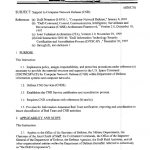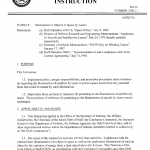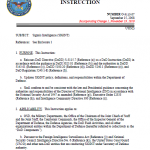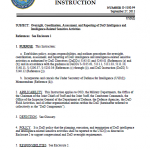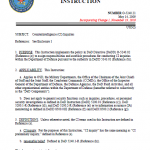This handbook provides basic reference information on Afghanistan, including its geography, history, government, military forces, and communications and transportation networks. This information is intended to familiarize military personnel with local customs and area knowledge to assist them during their assignment to Afghanistan.
Tag Archive for Department of Defense
Joint Chiefs of Staff
Restricted Joint Chiefs of Staff Manual: Global Status of Resources and Training System (GSORTS)
Department of Defense
DoD Government Shutdown Contingency Plans September 2013
Department of Defense
(U//FOUO) DoD Defense Security Enterprise Strategic Plan 2013

To reduce deficiencies in security, DoD Directive 5200.43 established the Defense Security Enterprise (DSE) Executive Committee (ExCom). The ExCom is the senior-level governance body for the strategic administration and policy coordination of the DSE. The ExCom created and tasked the DSE Advisory Group (DSEAG) to plan, coordinate, and prioritize decisions for the ExCom and establish, oversee, and launch project teams. These project teams receive tasks from the DSEAG, research an issue, and recommend a plan of action.
Afghanistan, Department of Defense
Special Inspector General Strategic Plan for Tracking Anti-Corruption Progress in Afghanistan
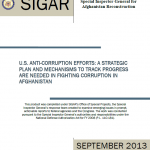
Reducing corruption and increasing accountability are important components of the U.S. reconstruction strategy in Afghanistan. Since 2002, the United States has appropriated over $96 billion for reconstruction assistance in Afghanistan and, as part of that assistance, has designated numerous programs or activities to directly or indirectly help strengthen the ability of Afghan government institutions to combat corruption. In 2010, in line with a commitment to provide more assistance directly to the Afghan government, the United States and other donors committed, in part, to providing technical assistance to develop the Afghan government’s capacity to reduce corruption. The ability of the Afghan government to deliver services to its citizens without the illicit diversion of resources is crucial to the country’s development and the government’s standing as a legitimate, sovereign authority. Further, as Afghanistan subsequently enters a transformation phase during which it will need to rely on progressively smaller amounts of funding from international donors, it must work to ensure that the revenue it generates is not susceptible to graft and corruption.
Department of Defense, FEMA
FEMA U.S. Army/DoD Memorandums of Understanding
Department of Defense
DoD Joint Terminology for Cyberspace Operations
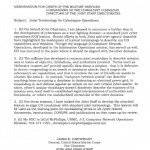
The following definitions align key cyberspace operations (CO) concepts with doctrinally accepted terms and definitions used in the other joint operational domains. For explanatory purposes, in each case, the current Information Operations (IO) doctrinal definition for some aspect of CO is presented, followed by its conventional analogue, if any, and the current terminology it would replace.
Department of Defense
Defense Science Board Report: Unconventional Operational Concepts and the Homeland
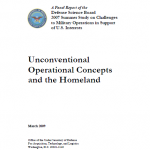
This report on unconventional operational concepts and the homeland was prepared as part of the Defense Science Board 2007 Summer Study on Challenges to Military Operations in Support of National Interests. The summer study recognized that asymmetric tools of war in the hands of potential adversaries may well be employed using non-traditional concepts of operation. Moreover, the battlefield may no longer be limited to regions afar, but may include the U.S. homeland. The United States could well confront the possibility of going to war abroad in the face of significant devastation in the homeland—dividing forces between homeland catastrophe relief operations and combat abroad, or even facing the possibility that deploy and supply of U.S. military forces could be delayed and disrupted.
Department of Defense
Restricted DoD Guide: Individual Protective Measures to Combat Terrorism
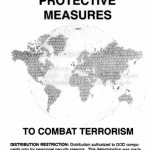
This pamphlet is designed to foster your awareness of the terrorist threat, to provide techniques for you to actively protect yourself and your family, and to help ensure the process of changing our mindset from complacency to constant vigilance. It is intended to serve as a guide, and you should incorporate the measures that apply to you and your family.
Department of Defense
(U//FOUO) DoD Instruction: Biometric Enabled Intelligence (BEI) and Forensic Enabled Intelligence (FEI)
Department of Defense
(U//FOUO) DoD Instruction: Human Intelligence (HUMINT) Training-Joint Center of Excellence (HT-JCOE)
Department of Defense
(U//FOUO) DoD Manual: Computer Network Defense (CND) Service Provider Certification Process
Department of Defense
(U//FOUO) DoD Instruction: Support to Computer Network Defense (CND)
Department of Defense, Department of Homeland Security, Department of Justice, Federal Bureau of Investigation
U.S. Government Foreign Telecommunications Providers Network Security Agreements
A collection of Network Security Agreements (NSAs) entered into with foreign communications infrastructure providers ensuring U.S. government agencies the ability to access communications data when legally requested. The agreements range in date from 1999 to 2011 and involve a rotating group of government agencies including the Federal Bureau of Investigation (FBI), Department of Homeland Security (DHS), Department of Justice (DoJ), Department of Defense (DoD) and sometimes the Department of the Treasury. According to the Washington Post, the agreements require companies to maintain what amounts to an “internal corporate cell of American citizens with government clearances” ensuring that “when U.S. government agencies seek access to the massive amounts of data flowing through their networks, the companies have systems in place to provide it securely.”
Department of Defense
(U//FOUO) DoD Instruction: Balanced Survivability Assessments (BSAs)
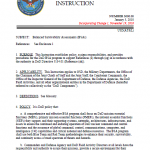
Multidisciplinary, integrated, performance-based, mission survivability assessments to identify and quantify vulnerabilities in systems, networks, architectures, infrastructures, and assets that support DoD MEFs, PMEFs, or the NEFs they support, to assess the mission impact if the vulnerabilities were successfully exploited, and to recommend measures to remediate or mitigate the vulnerabilities.
Joint Chiefs of Staff
Restricted Joint Chiefs of Staff Manual: Electronic Attack Exercises in U.S. and Canada
Department of Defense
DoD and Chairman of Joint Chiefs of Staff Limited Release Directives, Instructions and Manuals
A series of “limited release” directives from the Department of Defense and the Chairman of the Joint Chiefs of Staff including instructions, directives and manuals detailing DoD policy on a variety of topics from counterintelligence to the use of lasers in space.
Department of Defense
(U//FOUO) DoD Instruction: Illumination of Objects in Space by Lasers
Department of Defense
(U//FOUO) DoD Instruction: Signals Intelligence (SIGINT)
Department of Defense
(U//FOUO) DoD Manual: Defense Industrial Base (DIB) Cybersecurity Program Classification Manual
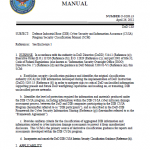
DIB CS/IA is the DoD program to protect critical DoD unclassified program, technology, and operational information residing on, or transiting, DIB unclassified networks. DoD Components and industry participants collaborate to protect DoD information through the development, implementation, and execution of DoD and DIB processes and procedures.
Department of Defense
(U//FOUO) DoD Instruction: Intelligence Oversight, Coordination, Assessment and Reporting
Department of Defense
(U//FOUO) DoD Instruction: Raven Rock Mountain Complex (RRMC)
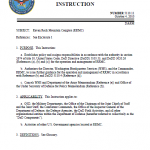
The mission of RRMC is to support the Secretary of Defense, the Chairman of the Joint Chiefs of Staff, select DoD Components and, as appropriate, non-DoD agencies of the Federal Government, and to enable the execution of DoD mission-essential functions (MEFs) in accordance with DoDD S-5100.44 and continuity of operations (COOP) plans and operational orders.
Department of Defense
(U//FOUO) DoD Instruction: Counterintelligence (CI) Activities Supporting Research, Development, and Acquisition
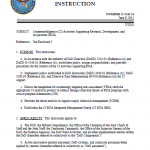
The CI mission in RDA informs the DoD Components and supporting CDCs of foreign collection threats and detects FIE targeting of defense-related technology. The CI support enables RDA program personnel to implement countermeasures and enables CI to develop activities that negate, counter, penetrate, or exploit an FIE.
Department of Defense
(U//FOUO) DoD Directive: Counterintelligence (CI)
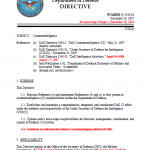
Defense CI activities shall be undertaken as part of an integrated DoD and national effort to detect, identify, assess, exploit, penetrate, degrade, and counter or neutralize intelligence collection efforts, other intelligence activities, sabotage, espionage, sedition, subversion, assassination, and terrorist activities directed against the Department of Defense, its personnel, information, materiel, facilities, and activities, or against U.S. national security.

